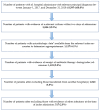Epidemiology and Economic Outcomes Associated with Timely versus Delayed Receipt of Appropriate Antibiotic Therapy among US Patients Hospitalized for Native Septic Arthritis: A Retrospective Cohort Study
- PMID: 36551387
- PMCID: PMC9774525
- DOI: 10.3390/antibiotics11121732
Epidemiology and Economic Outcomes Associated with Timely versus Delayed Receipt of Appropriate Antibiotic Therapy among US Patients Hospitalized for Native Septic Arthritis: A Retrospective Cohort Study
Abstract
Timely administration of appropriate antibiotic therapy is associated with better patient outcomes and lower costs of care compared to delayed appropriate therapy, yet initial treatment is often empiric since causal pathogens are typically unknown upon presentation. The challenge for clinicians is balancing selection of adequate coverage treatment regimens, adherence to antimicrobial stewardship principles to deter resistance, and financial constraints. This retrospective cohort study aimed to assess the magnitude and impact of delayed appropriate antibiotic therapy among patients hospitalized with septic arthritis (SA) in the U.S. from 2017 to 2019 using healthcare encounter data. Timely appropriate therapy was defined as the receipt of antibiotic(s) with in vitro activity against identified pathogens within two days of admission; all other patients were assumed to have received delayed appropriate therapy. Of the 517 patients admitted to hospital for SA who met all selection criteria, 26 (5.0%) received delayed appropriate therapy. In inverse-probability-treatment-weighting-adjusted analyses, the receipt of delayed appropriate therapy was associated with an additional 1.1 days of antibiotic therapy, 1.4 days in length of stay, and $3531 in hospital costs (all vs. timely appropriate therapy; all p ≤ 0.02). Timely appropriate therapy was associated with a twofold increased likelihood of antibiotic de-escalation during the SA admission.
Keywords: antibiotic; arthritis; cost measures; delayed; health care utilization.
Conflict of interest statement
Tristan T. Timbrook and Rachael B. Hemmert are employed by the research sponsor, BioMérieux, Inc. Dr. Joan-Miquel Balada-Llasat is a consultant for BioMérieux, Inc. Nicole Stamas, Tom Vincent, Cynthia Saiontz-Martinez, and Ariel Berger are employed by Evidera, a health economics outcomes research (HEOR) consultancy with previous and ongoing engagements with BioMérieux and other pharmaceutical, biotech, and medical device companies.
Figures

References
-
- Ferrand J., El Samad Y., Brunschweiler B., Grados F., Dehamchia-Rehailia N., Séjourne A., Schmit J.-L., Gabrion A., Fardellone P., Paccou J. Morbimortality in adult patients with septic arthritis: A three-year hospital-based study. BMC Infect. Dis. 2016;16:239. doi: 10.1186/s12879-016-1540-0. - DOI - PMC - PubMed
-
- Lodise T.P., Berger A., Altincatal A., Wang R., Bhagnani T., Gillard P., Bonine N.G. Antimicrobial Resistance or Delayed Appropriate Therapy-Does One Influence Outcomes More Than the Other Among Patients With Serious Infections Due to Carbapenem-Resistant Versus Carbapenem-Susceptible Enterobacteriaceae? Open Forum Infect. Dis. 2019;6:ofz194. doi: 10.1093/ofid/ofz194. - DOI - PMC - PubMed
-
- Landewé R.B.M., Günther K.P., Lukas C., Braun J., Combe B., Conaghan P., Dreinhöfer K., Fritschy D., Getty J., van der Heide H.J., et al. EULAR/EFORT recommendations for the diagnosis and initial management of patients with acute or recent onset swelling of the knee. Ann. Rheum. Dis. 2009;69:12–19. doi: 10.1136/ard.2008.104406. - DOI - PubMed
Grants and funding
LinkOut - more resources
Full Text Sources
Miscellaneous

